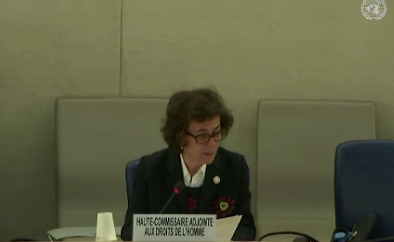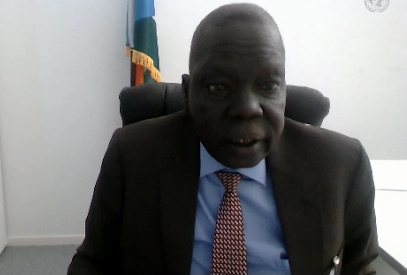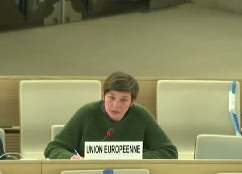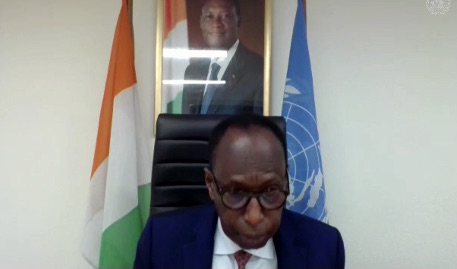49th Regular Session of the Human Rights Council
28 February - 1st April 2022
ITEM 4 - Agenda item 10: Technical assistance and capacity-building
29 March 2022
By Buba Ceesay / GICJ
Executive Summary
On the 29th of March 2022, the Human Rights Council held an interactive dialogue with the UN High Commissioner for Human Rights at the 51st meeting of the 49th regular session. The High Commissioner's report on technical assistance and capacity building for South Sudan was presented to the Council by the Deputy High Commissioner for Human Rights, Ms Nada Al-Nashif.
When presenting her report to the Council, Ms Nada Al-Nashif outlined some of the key human rights challenges facing South Sudan, the assistance provided by the Office of the High Commissioner and relevant bodies and recognised and commended the progress made by the Government of South Sudan. She stressed that serious human rights violations continue in South Sudan using the situation in Tambura as an example. She highlighted that the human rights situation in South Sudan remains characterised by localised violence, an entrenched culture of impunity that leads to a new cycle of violence, restriction of civic space and widespread conflict-related sexual violence. Nevertheless, Ms Al-Nashif commended the government for its commitment to the implementation of the Revitalised Agreement, including the re-constitution of the Transitional National Legislative Assembly (TNLA), the appointment of the first female president and the establishment of the technical committee of the Truth, Reconciliation and Healing Commission, as well as for its cooperation with OHCHR and other human rights mechanisms.
It also noted the technical assistance and capacity-building supports provided to South Sudan, notably UNMISS Human Rights Division's support to the South Sudan Human Rights Commission to enable it to undertake field missions and independent investigations, and to effectively monitor and report on human rights violations; continued capacity building of national civil society organisations and legal aid providers; a workshop on survivor-centred investigation and fact-finding techniques in the context of allegations of sexual violence; and support for the launch of the Joint Armed Forces Action Plan on Conflict-Related Sexual Violence. The Deputy High Commissioner concluded by noting that South Sudan is a young country that needs technical support and capacity building from the international community. She said her office would continue to support South Sudan. She reiterated the importance of a new constitution, the need for transitional justice, national reconciliation and healing, an end to widespread impunity.
On behalf of the country concerned, the representative of South Sudan indicated his government’s commitment to the full implementation of the Revitalised Agreement and stated that the remaining elements of the transitional justice programme will be implemented by mid-2022. With regard to the government's achievements, he informed the Council that a bill had been drafted to guide the process of drafting a permanent constitution, screening of forces to be integrated into the army had been completed, and the cessation of hostilities between the parties to the peace agreement and the permanent ceasefire, with varying degrees of compliance, remained in place. Satisfactory disarmament of civilians was also reported, and the Council was urged to implement its resolution on technical assistance and capacity building in South Sudan.
In the ensuing discussion, speakers welcomed the High Commissioner's report and commended South Sudan for its cooperation. Concerns about various human rights violations were raised and calls for the implementation of the Revitalised Agreement were reiterated. Concern was expressed over the slow pace of transitional justice, and the government was urged to implement the remaining elements.
Geneva International Centre for Justice welcomes the report and expresses its deep concern over the human rights violations and the ongoing sub-national violent conflict. It also calls on the government to redouble its efforts in implementing the transitional justice mechanism. It stressed that in light of the critical state of the South Sudanese transition, it is crucial that OHCHR and the international community continue to provide technical support and capacity-building to South Sudan to strengthen its judicial, legal and security institutions.
BACKGROUND
In resolution A/HRC/RES/46/29 dated 24 March 2021, the Human Rights Council requested the United Nations High Commissioner for Human Rights to present a comprehensive written report to it at its 49th session in an interactive dialogue. In accordance with that resolution, Ms Al-Nashif, Deputy High Commissioner for Human Rights, presented the High Commissioner's report on technical cooperation and capacity building for South Sudan to the Council during the 51st meeting of the 49th regular session of the Council. She underlined the main human rights challenges confronting South Sudan and acknowledged and welcomed the progress made by the South Sudanese government.
INTERACTIVE DIALOGUE
Presentation of the High Commissioner’s Report
Geneva, 29 March 2022- Ms Al-Nashif presented the High Commissioner's report to the Council and informed the Council that the High Commissioner's report outlines the human rights situation in South Sudan and the technical cooperation and capacity-building activities undertaken by the Office of the High Commissioner. She welcomed the significant decrease in documented armed violence by the parties of the Revitalised Agreement but raised concerns over reports of continued localised militia violence, killings, sexual violence, arbitrary arrests and detentions, forced displacement, abductions, looting and destruction of civilian property. The Deputy High Commissioner highlighted that the situation in Tambura is marked by grave and systematic violations of human rights and humanitarian law and she referred the Council to the OHCHR/UNMISS joint report published on 1 March 2022. It was noted that the report contained findings of investigations by the Human Rights Division, and she subsequently appealed to the relevant stakeholders to implement its recommendations.
In addition, Ms Al-Nashif commended South Sudan's progress on the implementation of the Revitalised Agreement, notably the re-constitution of the Transitional National Legislative Assembly (TNLA), appointment of the first female Speaker, and the establishment of the Technical Committee of the Truth, Reconciliation and Healing Commission. However, she noted with consternation the delay in the establishment of the Truth, Reconciliation and Healing Commission, the Compensation and Reparation Authority and the Hybrid Court.
 Furthermore, Ms Al-Nashif informed the Council that the report highlights localised violence and a prevailing culture of impunity leading to a new cycle of violence due to a lack of adequate judicial response. The Deputy High Commissioner thus called upon the International Community to continue assisting South Sudan in strengthening its rule of law institutions and transitional justice mechanisms in order to ensure perpetrators are effectively brought to justice.
Furthermore, Ms Al-Nashif informed the Council that the report highlights localised violence and a prevailing culture of impunity leading to a new cycle of violence due to a lack of adequate judicial response. The Deputy High Commissioner thus called upon the International Community to continue assisting South Sudan in strengthening its rule of law institutions and transitional justice mechanisms in order to ensure perpetrators are effectively brought to justice.
She indicated to the Council that the UNMISS Human Rights Division had provided technical assistance to the Human Rights Commission of South Sudan to enable it to undertake field missions and independent investigations, and to effectively monitor and report on human rights abuses. And it was noted that UNMISS continued to build the capacities of national civil society organisations and legal aid providers.
On the situation of women and girls in South Sudan, Ms Al-Nashif underscored the prevailing conflict-related sexual violence in the country and the continued impunity for such crimes. She highlighted the OHCHR's efforts in preventing and responding to such violations, and as part of the measures taken by OHCHR, the Council was informed that the UNMISS' Human Rights Division has conducted capacity-building activities aimed at the military, government agencies and the community. Among these activities was a workshop on survivor-centred investigation and fact-finding techniques in the context of sexual violence allegations, as well as assistance in launching the Joint Armed Forces Action Plan on Combating Conflict-Related Sexual Violence.
Moreover, Ms Al-Nashif expressed concern about the restriction of civic space in South Sudan, characterised by the arrest and detention of journalists, rights defenders and civil society actors, particularly in the run-up to the election period. It encouraged the government to open up civic space and refrain from restricting fundamental freedoms, which are necessary for free, fair and credible elections.
She concluded by acknowledging the South Sudanese government’s cooperation with the OHCHR and other human rights mechanisms and welcomed the initiative of the Ministry of Justice to establish an all-inclusive coordination mechanism with UNMISS and the UN Country Team to foster joint assessments, analysis and planning for capacity building. Finally, she commended the willingness of the government to engage with her office and expressed her readiness to continue supporting government efforts.
The Intervention by the country concerned
 The representative of South Sudan, in his presentation to the Council, stated that the South Sudanese President had reaffirmed his government's commitment to the implementation of the Revitalised Agreement and indicated that the remaining elements of the transitional justice programme would be implemented by mid-2022. He informed the Council of the completion of the screening of forces, the cessation of hostilities among the parties to the peace agreement and the maintenance of the permanent ceasefire, with varying degrees of compliance. He stated that civilian disarmament has proceeded satisfactorily, particularly in states affected by communal conflicts, and that campaigns are underway to continue disarming the civilian population.
The representative of South Sudan, in his presentation to the Council, stated that the South Sudanese President had reaffirmed his government's commitment to the implementation of the Revitalised Agreement and indicated that the remaining elements of the transitional justice programme would be implemented by mid-2022. He informed the Council of the completion of the screening of forces, the cessation of hostilities among the parties to the peace agreement and the maintenance of the permanent ceasefire, with varying degrees of compliance. He stated that civilian disarmament has proceeded satisfactorily, particularly in states affected by communal conflicts, and that campaigns are underway to continue disarming the civilian population.
In addition, the representative for South Sudan reiterated the country’s commitment to fully implementing chapter 5 of the Revitalised Agreement and declared its plan to establish the National Human Rights Advisory Council to follow up on regional conventions. He also indicated that a bill has been prepared and is awaiting legislative approval to guide the process of the permanent constitution. He further briefed the council that no response has been received so far on the government's request for technical assistance and capacity building from the council, which was adopted and is expected to be operational by March 2021 and September 2021 respectively. He urged the council to implement its resolution on technical assistance and capacity building in South Sudan.
Interventions of Delegations
 Delegations expressed concern over reports of widespread and localised violence, killings of civilians, displacement and sexual violence in South Sudan. The representative for the European Union, stated that the EU is alarmed by the pervasive violence and large-scale displacement of civilians. She asked the Deputy High Commission about the possibility of a credible and inclusive constitutional process, effective transitional justice mechanism and free and fair elections in South Sudan amidst the shrinking democratic space and the crackdown on human rights defenders, journalists and civil society representatives.
Delegations expressed concern over reports of widespread and localised violence, killings of civilians, displacement and sexual violence in South Sudan. The representative for the European Union, stated that the EU is alarmed by the pervasive violence and large-scale displacement of civilians. She asked the Deputy High Commission about the possibility of a credible and inclusive constitutional process, effective transitional justice mechanism and free and fair elections in South Sudan amidst the shrinking democratic space and the crackdown on human rights defenders, journalists and civil society representatives.
 The representative of Côte d'Ivoire, on behalf of the African Group, thanked the High Commissioner for the report and praised South Sudan's commitment to the implementation of the Revitalised Agreement. The group acknowledged the efforts of the government in the drafting of a permanent constitution that will pave the way for the establishment of a Hybrid Court. The representative restated the group’s full support for the efforts of the South Sudanese government to bring lasting peace in South Sudan and called on the Council to address the outstanding areas of technical capacity building.
The representative of Côte d'Ivoire, on behalf of the African Group, thanked the High Commissioner for the report and praised South Sudan's commitment to the implementation of the Revitalised Agreement. The group acknowledged the efforts of the government in the drafting of a permanent constitution that will pave the way for the establishment of a Hybrid Court. The representative restated the group’s full support for the efforts of the South Sudanese government to bring lasting peace in South Sudan and called on the Council to address the outstanding areas of technical capacity building.
The representatives for Senegal and Kenya aligned themselves with the African Group's statement,commending South Sudan for its cooperation with HRC and urged it to implement Chapter 5 of the Revitalised Agreement. The representative for Egypt, acknowledged South Sudan's cooperation with the HRC and human rights mechanisms, and applauded its efforts in the implementation of the Revitalised Agreement. The government was called on to establish the Hybrid Court, investigate alleged human rights violations and ensure security and stability in the country.
In addition, the representatives for Venezuela (Bolivarian Republic of) and China all welcomed South Sudan's commitment to implement the Revitalised Agreement and to ensure respect for human rights. They called on the international community to continue to support South Sudan in technical assistance and capacity building. For its part, the representative for Switzerland, welcomed the High Commission's report and urged South Sudan to intensify its efforts and establish an inclusive national dialogue and institutional reform. Concern was expressed over the continuing reports of human rights violations and the South Sudanese government was strongly encouraged to implement the joint recommendations issued by UNMISS and UNHCR on 1 March 2022. The representative for the Republic of Korea, warmly welcomed the commission's reports and saluted the efforts made by South Sudan in the implementation of the agreement. However, the representative echoed concerns about the on-going sub-national conflicts and human rights violations, especially sexual violence and accordingly, reasserted the importance of providing technical assistance to South Sudan.
The representatives for the United States of America and the United Kingdom of Great Britain and Northern Ireland were appalled by the continuing violations of human rights in South Sudan and reiterated the need for technical assistance.
Interventions of National Human Rights Institutions and Non-Governmental Organisations.
Non-governmental organisations and civil society groups expressed their appreciation for the High Commissioner's report and to the government of South Sudan for its continued cooperation. The significance of a full implementation of the Revitalised Agreement was restated. Concerns were raised by speakers about the conflict-related abuses and restrictions on political and civil spaces. Speakers also voiced their concerns over the escalation of Electoral Violence in the run-up to potential political elections next year. They also deplored the slow progress in setting up transition mechanisms, which they stated demonstrates lack of political will. Finally, the importance of building key institutions for the completion of the transition process was reasserted.
Concluding Remarks
In her concluding remarks, the Deputy High Commission noted that South Sudan is a young democracy that needs the support of the international community to strengthen its legal and institutional framework in accordance with international standards. Ms Al-Nashif stated that the government is aware of the expectations of its people for peace, security, sustainable development and good governance, as well as making national resources available to provide essential services, including health and education. She emphasised the need for the government of South Sudan to address the root causes of the current conflict. The Deputy High Commissioner reiterated the importance of a new constitution and stressed that the process should be more effective, inclusive and timely.
Ms Al-Nashif further underscored the need for transitional justice, national reconciliation and healing and recognised the support of the Commission on Human Rights to South Sudan in achieving transitional justice. She informed the Council of the contribution of the UNMISS Human Rights Division to the protection of civilians, including monitoring violations of international human rights law, international humanitarian law and international law, and following up on procedures and reports, including the Joint Action Plan on combating sexual violence. Despite the entrenched impunity and lack of accountability for gross human rights violations and abuses, serious violations of international humanitarian law and international crimes the Deputy High Commissioner declared that the Office of the High Commissioner will continue to provide technical cooperation, including a variety of expertise. She noted that while efforts are being made to bring perpetrators to justice, widespread impunity is still a major concern and urged the government to support the mobile courts and district courts martial and replicate it all over the country.
POSITION OF GENEVA INTERNATIONAL CENTRE FOR JUSTICE
Geneva International Centre for Justice (GICJ) welcomes the High Commissioner's report and commends the cooperation of South Sudan. We are appalled by the continuing sub-national violent conflict, particularly in Central Equatoria, and urge the government to intensify its efforts to ensure a lasting peace and the full resettlement of IDPs. The gruesome sexual violence, the state crackdown on dissent and the unprovoked thuggery of the South Sudanese security forces, particularly the NSS, must be investigated and addressed. South Sudan must demonstrate its willingness to end human rights violations and bring perpetrators to justice. Transitional justice in South Sudan must not be permitted to falter for reasons of political expediency. It is also paramount that all key elements of the Revitalised Agreement be implemented. In light of the critical state of the South Sudanese transition, it is crucial that the Office of the High Commissioner and the international community continue to provide technical support and capacity-building to South Sudan to consolidate its legal and security institutions
Technical Assistance, Capacity Building, Interactive Dialogue, South Sudan, High Commissioner, United Nations, Human Rights, GICJ, Geneva International Centre for Justice, Geneva4Justice, Justice




